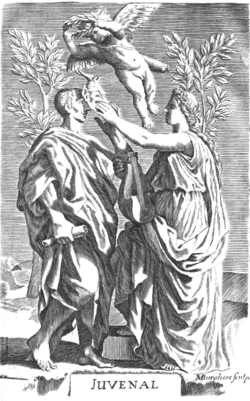Juvenal Quote
An incurable itch for scribbling takes possession of many and grows inveterate in their insane breasts.
Juvenal
An incurable itch for scribbling takes possession of many and grows inveterate in their insane breasts.
Tags:
authorship
Related Quotes
I could doubt the value of my books as much as many do, except that, as a researcher and very curious person, I do read a lot too, and can clearly see the difference in value between what I do and wha...
Robin Sacredfire
Tags:
altruism, author, authors, authorship, daniel marques, freemasonry, illuminati, kindness, positivism, research
About Juvenal
Decimus Junius Juvenalis (Latin: [ˈdɛkɪmʊs ˈjuːniʊs jʊwɛˈnaːlɪs]), known in English as Juvenal ( JOO-vən-əl; c. 55–128), was a Roman poet. He is the author of the Satires, a collection of satirical poems. The details of Juvenal's life are unclear, but references in his works to people from the late first and early second centuries AD suggest that he began writing no earlier than that time. One recent scholar argues that his first book was published in 100 or 101. A reference to a political figure dates his fifth and final surviving book to sometime after 127.
Juvenal wrote at least 16 poems in the verse form dactylic hexameter. These poems cover a range of Roman topics. This follows Lucilius—the originator of the Roman satire genre, and it fits within a poetic tradition that also includes Horace and Persius. The Satires are a vital source for the study of ancient Rome from a number of perspectives, although their comic mode of expression makes it problematic to accept the content as strictly factual. At first glance the Satires could be read as a critique of Rome.
Juvenal wrote at least 16 poems in the verse form dactylic hexameter. These poems cover a range of Roman topics. This follows Lucilius—the originator of the Roman satire genre, and it fits within a poetic tradition that also includes Horace and Persius. The Satires are a vital source for the study of ancient Rome from a number of perspectives, although their comic mode of expression makes it problematic to accept the content as strictly factual. At first glance the Satires could be read as a critique of Rome.
